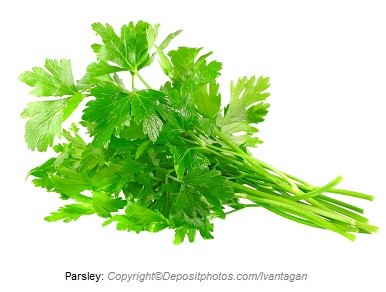Parsley is a green leafy vegetable from Apiaceae family and related to  coriander and dill. One cup of parsley contains 4 grams of carbohydrates, 2 grams of protein and 2 grams of fiber.
coriander and dill. One cup of parsley contains 4 grams of carbohydrates, 2 grams of protein and 2 grams of fiber.
Average calories: 24 per one cup, fresh.
|
Parsley: one cup, fresh |
|
|
Carbohydrate |
4 |
|
Fiber |
2 |
|
Protein |
2 |
|
Fat |
0 |
|
Calories |
24 |
Vitamins found in higher amounts: vitamins K, C, A, and B9. One cup of parsley provides 5055 IU of vitamin A, 985 mcg of vitamin K, and 80 mg of vitamin C.
Minerals found in higher amounts: iron, magnesium, potassium and magnesium.
Phytonutrients found in higher amounts and their health benefits: parsley is rich in carotenoids, volatile oils (myristicin, limonene, eugenol, and alpha-thujene), flavonoids (epigenin, crisoeril, and luteolin), and phenolic compounds (caffeic acid and chlorogenic acid).
Carotenoids include beta-carotene, lutein and zeaxanthin. They support healthy eyes. Flavonoids and phenolic compounds are potent antioxidants with anti-inflammatory, anti-cancer and immune-boosting properties.
Volatile oils have antibacterial activities. One of the volatile oils, myristicin, displays a chemoprotective effect against cancers. It also neutralizes benzopyrenes, the cancer-producing substances found in cigarette and charcoal grill smokes. Volatile oils are also used in perfumes, cosmetics, and flavoring foods and drinks.
Apigenin, also found in artichoke, may stimulate the growth of the damaged nerve cells, making it be beneficial in Multiple Sclerosis (MS).

